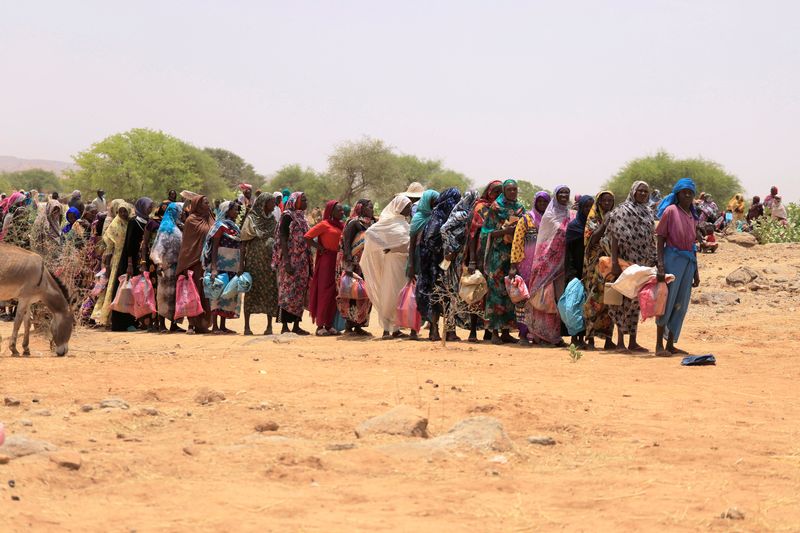By Zohra Bensemra and Mahamat Ramadane
KOUFROUN, Chad (Reuters) - Fleeing the village to escape from attackers, crossing a desert border, building a shelter from straw and rags, waiting for food aid: these are familiar hardships for Halime Adam Moussa, who has fled Sudan for Chad with her family for a second time.
Moussa, 68, is one of 60,000 Sudanese refugees, mostly women and children, who have poured over the border since war broke out on April 15, seeking safety in Chad, one of the world's hungriest, most neglected countries.
For her, it is a repeat journey. In 2003, she had fled her village of Tidelti, in Sudan's western region of Darfur, when it came under attack by government-backed janjaweed militia, ethnic Arabs who were then targeting African farmers and herders.
A mother of seven, she spent six years in a refugee camp in Chad with her children before being allocated a small plot of land to farm, which allowed her to get by for a decade.
Her children grew up in Chad and some married Chadian citizens, but she yearned for home and went back to Darfur with some of her children and grandchildren in 2020, rebuilding her old house and reconnecting with family and friends.
Now, the fighting in Sudan between the military and a paramilitary force that evolved from the janjaweed has stirred up tensions in Darfur that were never fully resolved and intercommunal fighting has forced her to flee again.
Moussa is now living in a makeshift refugee camp that is rapidly spreading into the desert around the sleepy Chadian border town of Koufroun, reeling from the latest loss of her home and livelihood from farming.
HUNGER
"If you have land, even if you have no money you can sell your produce to survive, but when you have nothing, you suffer," she said, sitting on a mat in front of an improvised hut made from straw, pieces of cloth and plastic.
Moussa is sharing her meagre space and resources with children and grandchildren who fled Tidelti with her.
The landscape is flat and barren, a brown expanse of sand dotted with scrubby trees. Water comes from wells dug into the arid soil and carried in jerricans by the women. Getting food involves long queues in the glare of the sun.
Chad, which shares a 1,400-km (870-mile) border with Sudan, was already struggling to cope before the latest influx of Darfuris joined some 600,000 refugees, mostly Sudanese who fled earlier waves of violence in their country.
In total, 2.3 million people in Chad are in urgent need of food aid and the United Nations World Food Programme (WFP) has issued an urgent appeal for $162.4 million to help feed them.
Chad has one of the worst hunger problems in the world. More than a third of its children under five are stunted. The U.N.'s $674 million annual programme to support the country is so far only 4.6% funded.
The WFP is warning that without more funding, food assistance for refugees and Chadians risks drying up.
"We have no choice but to fend for ourselves if humanitarian aid stops," said Harana Arabi Souleymane, 65, who like Moussa fled Darfur for a second time. She had spent two years in Chad in 2003-2005, at the height of the Darfur conflict, before returning home.
She said that if the situation stabilised in Sudan, she and her relatives would go home, where they have houses and land.
"But if violence continues, we will have to build houses to restart our lives here. We can stay here for years, for as long as the Chadian authorities allow us."
